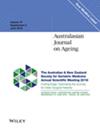Using acousmatic storytelling to facilitate communication and social interactions in people living with dementia: An iterative exploratory 12-week study
Abstract
Objective
Communication challenges in people living with dementia can limit social interactions with fellow residents and hinder professional carers' ability to provide person-centred care. While research highlights the benefits of reminiscence, storytelling and music interventions in facilitating social interaction, the potential of using soundscapes in storytelling remains underexplored. This qualitative study investigated how acousmatic storytelling—using sound recordings and music to inspire storytelling, evoke imagery and emotion, and iteratively develop hybrid audio compositions—can enhance communication and social interactions in people living with dementia.
Methods
Twelve one-hour workshops were conducted with individuals in the early to mid-stages of dementia at a care home, using auditory cues (music and soundscapes) and visual prompts (photographs and poems) to stimulate memory recall, storytelling and group discussion. Data were collected through video and audio recordings, participant observation and semi-structured interviews with care workers.
Results
Inductive thematic analysis identified two key themes in verbal communication: (1) reminiscence and (2) creative sound associations, as well as five themes for non-verbal behaviours: (1) supporting verbal communication, (2) substituting verbal communication, (3) expressing emotions, (4) enhancing rapport with others and (5) expressing musicality. These themes highlight how participants engaged meaningfully in both storytelling and group interactions.
Conclusions
Findings suggest that acousmatic storytelling offers a platform for individuals living with dementia to engage in verbal communication, employ purposeful non-verbal behaviours and participate in meaningful social interaction. This highlights its potential as a narrative approach for enhancing person-centred care in long-term care settings.


 求助内容:
求助内容: 应助结果提醒方式:
应助结果提醒方式:


